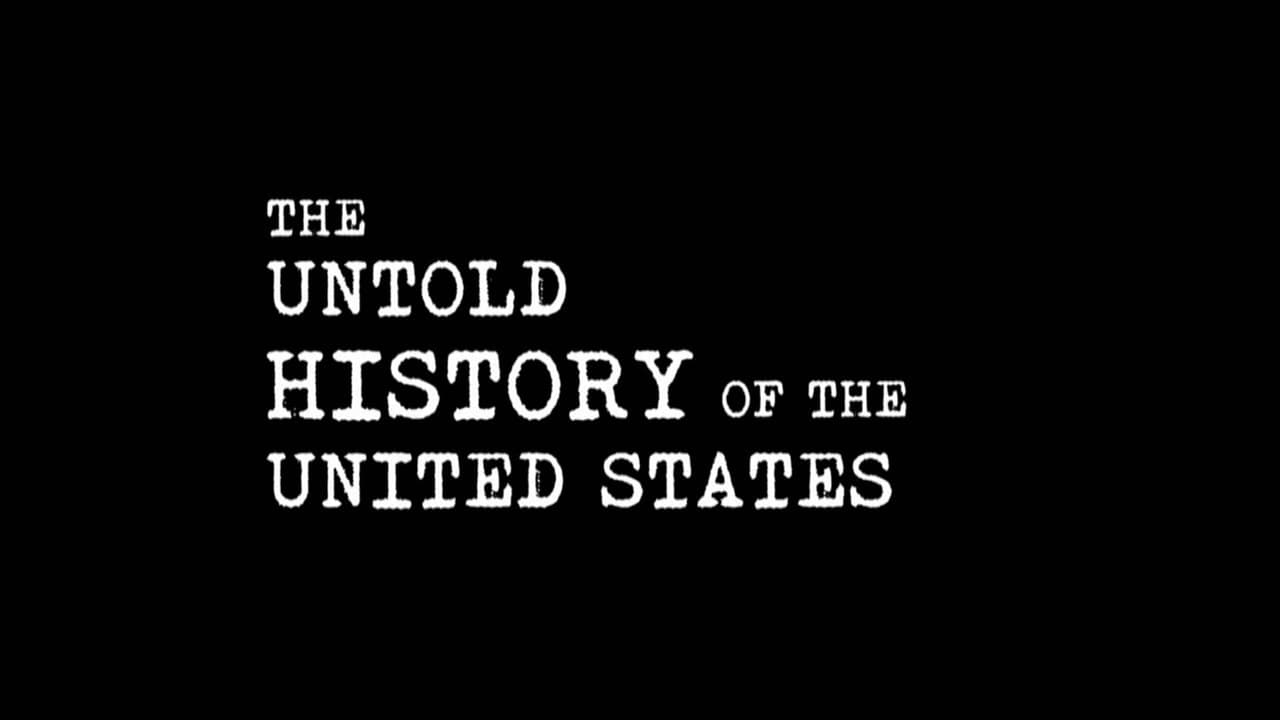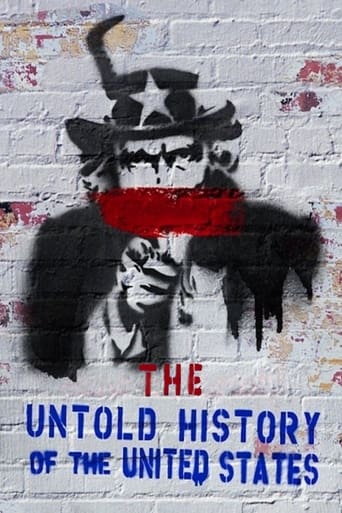TrueJoshNight
Truly Dreadful Film
Reptileenbu
Did you people see the same film I saw?
Dynamixor
The performances transcend the film's tropes, grounding it in characters that feel more complete than this subgenre often produces.
Myron Clemons
A film of deceptively outspoken contemporary relevance, this is cinema at its most alert, alarming and alive.
TarkovskyFanGirl
First of all, The Untold History of the United States is somewhat of a misnomer as a title because most of this is common knowledge or already taught in standard U.S. history courses--only remotely novel aspect to this is Kuznick and Stone's conjecture, opinion, Wallace/FDR worship, and what ifs about the political climate during WWII and the subsequent Cold War.What if FDR didn't conform to outside pressures and went with Wallace instead of Truman? What if we didn't drop the bombs on Hiroshima and Nagasaki? What if we conciliated our differences with communist ideologues? What if...? And on, and on. Plenty of what is said is true but subterfuge is common, wherein they present a positive spin on many figures and sort of hand wave away their faults or never admit it at all. Quite a number of communist ideologues who slaughtered and oppressed their people are often seen in a rather benign light, and, in contrast, it's not uncommon to feel as if U.S. figures are unfairly demonized in comparison. Oh, hey Joseph McCarthy, let me call you a venomous snake and play ominous music whenever you appear, and I'll play weepy violin music for when Stalin dies--and let us make sure to portray Stalin with the old "papa joe" image! Both of these were juxtaposed together in practically the same breath.There is still a lot of speculation by historians concerning the dropping of the atomic bombs on Japan. Both bombs were dropped 3 days apart and Stalin invaded Manchuria around the same time. It's hard to say what made Japan surrender because everything was so close together. Maybe they would have surrendered without Russia's involvement or without the bombs. Maybe one or the other would have been needed (definitely should have waited longer to drop the second bomb, if it was necessary at all, in HINDSIGHT). There are a lot of maybes and it's much easier to speculate in hindsight and play armchair philosopher. Here is another what if: what if we didn't drop the bombs and the war lingered on and Russia invaded mainland Japan and the country was partitioned similar to what happened in Berlin? Bad things can happen from what ifs, not just Stone's Kumbaya vision quests.While I agree that we often picked a regime that wasn't really any better than what they were competing against or the preexisting status quo, and the U.S. world policing has often done more harm than good, I found it rather funny that Stone paints Allende in such a positive light, who was a Marxist and had absolutely horrendous policies with starving citizens on par with 2018-level Venezuela, and the country was about to collapse. A coup was inevitable. Yes, Pinochet did bad things but Chile prospered in comparison to what preceded him, and he didn't kill nearly as many people compared to Castro's regime, who Stone never says a bad word about (because we sided with Batista and a lot of leftist figures seem quite fond of Castro for some reason). If we would have sided with Allende (WHAT IF???), then we'd probably be blamed for that too.As for the cold war, Stone tends to present the U.S. as being mostly to blame, even though it was both sides contributing to the problem rather than the Soviets responding to U.S. aggression. Also, while I generally agree with Truman's sentiment about the red scare and blacklisting, as highlighted in one of his quotes about how the U.S. should not be an entity on a witch hunt for dissenters, I wouldn't say that the condemnation of the communists in the U.S. was without reason. It's a destructive ideology and that was during the Cold War, against the Soviets, who were spreading the ideology and were the enemy of the United States. If you're actively fighting against communist ideologues, then it seems strange to allow them to proliferate and maintain roles in hollywood, politics, the education system, etc, where they have a pulpit to spread an ideology that is deemed antithetical to the United States' ideology--and perhaps allowing them to take over from within (granted, it was also often used to slander political enemies with no ties to communist ideology). Even now you see a very biased perspective in the media and school system. These systems are far more liberal than they are conservative; could not the same happen with any ideologues that infiltrate and maintain power? One might argue that we never weeded out the communist ideologues and their ideas have been presented in the media and academia in a manner more palatable and accepted by the masses. "Like Nixon, Bush appealed to voters' racism and fears of crime." This is actually a verbatim quote. And he goes on to blame the "far right" for everything without ever slowing down to analyze the flaws of the "far left."Admittedly, it is pretty well-made and has a lot of good footage compiled together, if you can tolerate Stone's spin on history. It's often propagandistic (complete with very schmaltzy music) in a very effective manner, such as Reagan's quoted reevaluation of the Vietnam War, where he laments the scenario but goes on to say that regardless of not winning the war and the many failings of the U.S., that it was for a noble cause--then immediately the scene cuts to a man blocking the camera and moving out of frame to reveal a dead child on the blood-spattered ground. It's excellent propaganda at times, not unlike Davis's Hearts and Minds.
keelhaul-80856
This is a very interesting documentary that focuses on little- acknowledged facts that may very well change the views of average Americans, if their teachers or the media ever bothered to delve into it. I always enjoy any piece like this that sheds new light on subjects of history, religion, or politics. The only reason I don't rate it as a 7 or 8 is simply because of my own in-depth studies of history and my knowledge of Oliver Stone's other works. While he provides a great deal of lesser-known facts regarding FDR's administration, the world wars, etc. he still seems to leave viewers with the impression that the Soviet Union, China, Cuba, and other areas under communist regimes were actually just nice guys with no real axe to grind. In leaving out the other hidden histories of what truly happened in many of these nations, leading up to the points where they intersect with US affairs, I feel it leaves the wrong impression that the US is solely to blame for multi-faceted problems and doesn't address the hidden hands of bankers and secret societies and communists who brought on many issues and atrocities. Similar to his treatment of the JFK saga, Stone gets some of it right, and does a good job of at least raising good questions and shedding light on obscure facts, but doesn't quite hone in on the full picture. Still, worth a watch, but I would suggest a much deeper study of the wars, ideologies, and other agendas at play.
Chuck D
This is a scary kind of series because it masquerades as facts when, in reality, much of it is hardly factual and material is often misrepresented. Many of the quotes are misrepresented and partial; some citations are inaccurate or cite less-than-reliable sources...I don't even know where to start and where to end. Just be careful. There are holes everywhere, and if you don't know much about history it's easy to believe it.
MisterWhiplash
The whole thrust of this and much of the content reminds me of the line from Stone's own JFK when going over some initial pieces of potential evidence on Lee Harvey Oswald and the JFK assassination conspiracy: "There's a lot of smoke here, but where there's smoke, there's fire." This series, a major work for Oliver Stone, gets going through the premise that Henry Wallace, a true progressive in the early 1940's democratic party, could have been a true force for change but was shut out of the 1944 convention, leading to Harry S. Truman as FDR's newest vice president. The 'would-be' part of it is certainly intriguing, and the evidence seems to have credibility (Stone narrates it all), but even if it's phooey and the claims against Truman may be harsh, the fact still stands on who dropped the first nuclear Atomic bombs on a (at the time enemy) country, leading to a nuclear arms race and the Cold War for decades to come.There's so much here over the course of some ten or more hours that it may be hard to all take in at once. It may not be that kind of experience, perhaps better to not binge-watch but take in over a week or several nights. It's a full course meal of information which is certainly not something that is ra-ra pro-American (but you should hopefully know that, even coming from his quintessential film, Platoon, where the climax of that was the Americans losing to the Vietnamese in a brutal battle). There's much that you also won't possibly expect that isn't necessarily *all* about the United States which is the fascinating part; just how much Russia was crucial in World War 2 and how their casualties were so catastrophic, but yet eclipsed in the pages of history by other countries losses. Or the details surrounding just how damn close the US did come to war with Russia over the Cuban missile crisis. Or so many other, nasty things.I think Stone is coming from a hopeful place here, and his damnations and critique aren't from a complete crank and blow-hard. He may have that in him, but his intentions are pure and with an intent of consciousness expansion: get you thinking about things, maybe you go find information for yourself, and don't always tow the line on everything you're told (not just Americans, around the world is the key point I think, though especially Americans). It's an overview of the past 70 years as only Oliver Stone can do it, and it's exhilarating, befuddling, infuriating, perplexing, terrifying, sad and perhaps questionable stuff. But that's better than something you can easily digest with your stick-in-the-mud grandpa, right?

